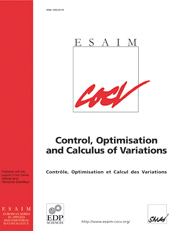Crossref Citations
This article has been cited by the following publications. This list is generated based on data provided by
Crossref.
Talischi, Cameron
Paulino, Glaucio H.
Pereira, Anderson
and
Menezes, Ivan F. M.
2012.
PolyTop: a Matlab implementation of a general topology optimization framework using unstructured polygonal finite element meshes.
Structural and Multidisciplinary Optimization,
Vol. 45,
Issue. 3,
p.
329.
Caubet, Fabien
Dambrine, Marc
and
Kateb, Djalil
2013.
Shape optimization methods for the inverse obstacle problem with generalized impedance boundary conditions.
Inverse Problems,
Vol. 29,
Issue. 11,
p.
115011.
Dapogny, Charles
Faure, Alexis
Michailidis, Georgios
Allaire, Grégoire
Couvelas, Agnes
and
Estevez, Rafael
2017.
Geometric constraints for shape and topology optimization in architectural design.
Computational Mechanics,
Vol. 59,
Issue. 6,
p.
933.
Laurain, Antoine
2018.
A level set-based structural optimization code using FEniCS.
Structural and Multidisciplinary Optimization,
Vol. 58,
Issue. 3,
p.
1311.
Dambrine, M.
and
Lamboley, J.
2019.
Stability in shape optimization with second variation.
Journal of Differential Equations,
Vol. 267,
Issue. 5,
p.
3009.
Oliver, J.
Yago, D.
Cante, J.
and
Lloberas-Valls, O.
2019.
Variational approach to relaxed topological optimization: Closed form solutions for structural problems in a sequential pseudo-time framework.
Computer Methods in Applied Mechanics and Engineering,
Vol. 355,
Issue. ,
p.
779.
Dambrine, Marc
and
Harbrecht, Helmut
2020.
Shape Optimization for Composite Materials and Scaffold Structures.
Multiscale Modeling & Simulation,
Vol. 18,
Issue. 2,
p.
1136.
Yago, Daniel
Cante, Juan
Lloberas-Valls, Oriol
and
Oliver, Javier
2022.
Topology Optimization Methods for 3D Structural Problems: A Comparative Study.
Archives of Computational Methods in Engineering,
Vol. 29,
Issue. 3,
p.
1525.
Dapogny, Charles
2022.
The topological ligament in shape optimization: a connection with thin tubular inhomogeneities.
The SMAI Journal of computational mathematics,
Vol. 7,
Issue. ,
p.
185.
Klein, Aaron
Nair, Prasanth B.
and
Yano, Masayuki
2022.
A priori error analysis of shape derivatives of linear functionals in structural topology optimization.
Computer Methods in Applied Mechanics and Engineering,
Vol. 395,
Issue. ,
p.
114991.
Pozzi, Matteo
Bonaccorsi, Giacomo
Kim, Hyunsun Alicia
and
Braghin, Francesco
2023.
Robust structural optimization in presence of manufacturing uncertainties through a boundary-perturbation method.
Structural and Multidisciplinary Optimization,
Vol. 66,
Issue. 6,
Herrero-Pérez, David
and
Picó-Vicente, Sebastián Ginés
2023.
A parallel geometric multigrid method for adaptive topology optimization.
Structural and Multidisciplinary Optimization,
Vol. 66,
Issue. 10,
Abdel Nour, Wassim
Jabbour, Joseph
Serret, Damien
Meliga, Philippe
and
Hachem, Elie
2023.
A Stabilized Finite Element Framework for Anisotropic Adaptive Topology Optimization of Incompressible Fluid Flows.
Fluids,
Vol. 8,
Issue. 8,
p.
232.
Desai, J.
2023.
Optimization Methods for Structural Engineering.
p.
123.
Dapogny, Charles
and
Feppon, Florian
2023.
Shape optimization using a level set based mesh evolution method: an overview and tutorial.
Comptes Rendus. Mathématique,
Vol. 361,
Issue. G8,
p.
1267.
Cante, J.
Nuñez-Labielle, A.
Huespe, A. E.
and
Oliver, J.
2025.
Towards shock absorbing hyperelastic metamaterial design (II): A prospective multiscale buckling-lattice computational model.
Computational Mechanics,
Vol. 75,
Issue. 6,
p.
1817.
Caubet, Fabien
Dambrine, Marc
Gargantini, Giulio
and
Maynadier, Jérôme
2025.
Shape Optimization of Polynomial Functionals under Uncertainties on the Right-Hand Side of the State Equation.
SIAM Journal on Control and Optimization,
Vol. 63,
Issue. 4,
p.
2632.

